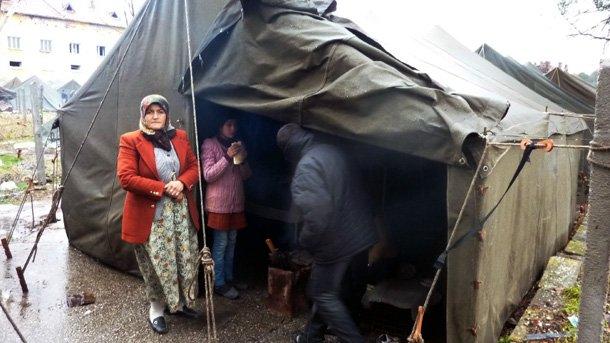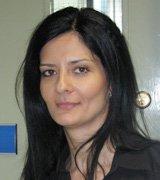
From one of the best refugee camps in Sofia we head for the camp that has the most problems – the one in Harmanly, close to the border with Turkey, the country the bulk of immigrants come from. Opened in a hurry at the beginning of August, it was overcrowded before the construction work was even completed. It was supposed to offer the best conditions – family caravans with bathroom and kitchen, hot water and central heating for 430. At the moment the camp accommodates 1,300 refugees, most of them living in tents, right on the bare ground, they don’t have water, electricity or heating. Electricity was only installed in the caravans a week ago. The old barracks are being renovated so that the people from the tents can be transferred there and should be ready within 10 days. In Harmanly there are 300 children and some 20 pregnant women. The expression used most often here is mafi, in Arabic meaning there isn’t any.
In front of one of the tents we see the sad eyes of a little boy who is running a fever. His grandmother Nerima says:
“We are all fleeing from the horrors of war. But here at the camp conditions are very bad, there is no water, no sewerage, no money, no food, no medicines, our children are all sick now that it is cold. We hope so very much to go to Western Europe. I have a brother and a sister in Germany and cousins in France. If conditions were better here we wouldn’t want to go anywhere else.”
We are at the camp at one of the rare times when a charity organization is making a donation. The protestant church and the Samaritans association from Stara Zagora have brought shoes and clothes for the people from the tents, all of them soaked to the skin and freezing. They sit in front of their tents warming themselves by large tins where they burn anything they can find. They use empty cans for plates. Humanitarian organizations have brought two pediatricians here to take a look at the children. Some of them are taken to the hospital in Harmanly with otitis and bronchitis. The volunteers travel to the town to buy and donate the necessary medicines. A Palestinian doctor from Jordan who has studied and now lives in Bulgaria helps his colleagues with the translation.

“Most of the children have a cough, a cold or bronchitis, otitis and almost all of them have diarrhea and stomach pains,” he says. ”We came here to help any way we can. Conditions are awful here. It is raining, cold and you can see for yourselves how people are living here. The living conditions are like in the refugee camps in Vietnam in the 70’s and Cambodia in the 60’s. But it is a disgrace to have living conditions like this in a European country.”

I am very angry, says Diana Dimova from the Samaritans association. This is her third visit to the camp and things are getting worse, rather than the other way round.
“The conditions are horrific,” she says. “Night time temperatures drop below zero. If things go on like this I expect people to die. This is a humanitarian crisis. We realize it is not easy to cope with 10,000 refugees. But so much time has gone by and I still don’t see a clear plan of action, everything is total chaos. I feel for the police working here, and for the social services from the town who volunteer to try to help these people, but they have neither the strength nor the money.”
The camp’s director Zhelyo Zhelev is also angry because during a recent riot, the refugees smashed some of the new bathrooms and toilets in the caravans. He says that by doing so they were hoping to be transferred sooner to another country with better conditions. Does he feel abandoned by the government?
“I think we have been abandoned by Europe, not by the government,” he says. “The government is doing its job, but Bulgaria’s capacity is small. We are a nation of 7 million, the population of a large European city. Our people here are badly paid and themselves emigrate to Europe. We need money to provide refugees with a decent quality of life, as well as human resources which have been exhausted.”
English version: Milena Daynova
Photos: Maria Dimitrova-Pichot
Athens plans to modernise the Greek army by 2030 Greece's Defence Minister Nikos Dendias presented the plan for changes in the army to the parties in parliament. The reforms will cover all three branches of the military. By 2030, 33 units..
A short video kaleidoscope of the "untold stories" of worthy Bulgarians - scientists, entrepreneurs, engineers, artists - who have contributed to our country's good image in the eyes of the world opened an unconventional public forum that showcased the..
The film "Gundi: Legend of Love" caused a sensation across the Ocean. Screenings of the film story about the life of legendary football player Georgi Asparuhov – Gundi were held in Los Angeles and Las Vegas as the halls were full...
Two graduates of the Bulgarian School "Saints Cyril and Methodius" in Jordan presented their achievements at an event at their school "Hadi al Muhammadi"..
1000 participants will take part in the first Burgas Half Marathon, which will take place this Sunday, 24 November. The event will bring together..
Radmila Sekerinska from North Macedonia appointed NATO Deputy Secretary General NATO Secretary General Mark Rutte has appointed Radmila Sekerinska..

+359 2 9336 661
